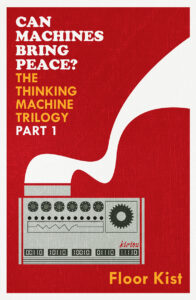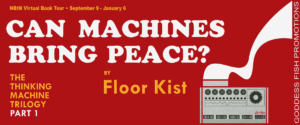 Today’s special guest author is Floor Kist to chat about his debut sci-fi novel, Can Machines Bring Peace.
Today’s special guest author is Floor Kist to chat about his debut sci-fi novel, Can Machines Bring Peace.
During his virtual book tour, Floor will be awarding a $30 Amazon or Barnes and Noble (winner’s choice) gift card to a lucky randomly drawn winner. For a chance to win, use the form below. To increase your chances of winning, feel free to visit his other tour stops and enter there, too!
Bio:
Floor Kist lives in a Dutch town called Voorburg with his wife, two sons, two cats and their dog Monty. He is currently deputy-mayor for the Green Party and an AI researcher. He’s concerned about current divisive public and political debates. But he’s also interested in how AI can be used to resolve society’s big issues.
This is his first novel. He’s been carrying the idea about a story about AI bringing peace for a long time. The Covid-19 lockdown in the Netherlands suddenly gave him time to actually write it.
Welcome, Floor. Please tell us about your current release.
Hi everyone!
Lisa, thank you so much for this interview. It’s always a pleasure to meet a fellow author. By the way, I love the twist at the end of your story “Discovered Identity.”
Thank you, Floor. It was fun to write.
I’ve written a science fiction novel. A genre I like a lot because of the new worlds it can build. I would say my novel is about hope. The sub-title is Hope in a Post-Apocalyptic Age.
After a grueling survival of a peace mission gone wrong, Kazimir, a young diplomat, wants to do everything he can to avoid that situation from happening. And because he sees The Marvelous Thinking Machine at the fairground, he decides he wants to build one to help bring peace. Only, he’s never done something like that before. But he gets help from his sister, Kira, who’s been hiding in her room for the past six months. The admiral’s daughter, Mizuki, finds herself interested in the project, although her father thinks it’s nonsense. Kazimir also manages to get Kuchi, a reluctant retired professor, on board. And finally, he finds the showman behind the fairground Machine.
And because he believes in all of them, he makes it work. He actually builds a rudimentary Thinking Machine that makes the mission more successful.
What I’ve tried to avoid is introducing a real bad guy. The opposition to his adventure is because of understandable vested interests and caution. The Thinking Machine is new, so why should others trust it? Won’t it replace some people who’ve been doing the work so far?
I like the way the five people find themselves brought together by something neither of them fully understands, but couldn’t be created without either one of them. And how they somehow find a way to work together.
What inspired you to write this book?
I think it’s my way of resisting all the nastiness that we’re being spoon-fed by today’s media. There is a focus on everything that goes wrong. But my father taught me that, if you look around carefully, there is a huge number of things going right. Of people doing the right thing and looking out for each other.
And furthermore, I’m fascinated with the possibilities of artificial intelligence. I’ve been interested in ways to improve all kinds of situations using technology. Over ten years ago, I wrote an expert system to help people make sense of complex stakeholder situations. And now I’m doing research in preparation of my doctoral thesis on AI and complex decision making. Since, I was fifteen and got my first home computer, I’ve been intrigued about everything new technology can bring.
And looking around in the world today, so many new – and yes, sometime scary – developments. But I overall, I believe new technology makes a lot of beautiful things happen. Like your site! (Thank you!)
Excerpt from Can Machines Bring Peace:
The memorial service is solemn. The admiral thanks the fallen officers for the ultimate sacrifice they made for the Empire. To the gathered wives, children, parents and grandparents he swears that they will not be forgotten. He tells the assembled men that he will do everything in his power to avoid these catastrophes in the future. And finally, he decorates the survivors, for their bravery and courage under fire. They are fine examples of Imperial officers.
Sugimoto shares the sentiment, of course. He is glad the admiral arranged this event. But it does feel a bit hollow, considering what happened to Kazimir Sakhalinsk. He steps forward when the admiral calls his name, announcing that he will lead the next mission.
He’s not surprised with his new orders. After Maeda’s death, Sugimoto expected as much. He gave his new team the report he received from the Kirisu-device as an example of what he expected. And they worked on the new one diligently. But he had to ask them to perfect it three times. And it took more than a week to prepare. Sakhalinsk’s Thinking Machine did it in half an hour. And Sakhalinsk’s is better.
Ogata will court-martial him for sure if Sugimoto visits Kazimir. But that’s preferable to dying in the middle of nowhere, isn’t it? It’s not as if Sakhalinsk will tell. He decides to risk it.
What exciting story are you working on next?
Well, Can Machines Bring Peace? Hope in a Post-Apocalyptic Age is part 1 of a trilogy. So, at the moment, I’m working on part 2. And it’s a lot tougher than I thought. In the first novel, I get to introduce all these wonderful characters. It was really a joy to see them take over the writing in wonderful ways.
Now, we already have all the characters. So, I’m trying to find a way to make them fresh and exiting again, without leaving behind all they’ve already done. A new situation has to challenge them in another way than it did in the first novel.
Actually, as this interview takes place, I’m working on each character’s motivations, desires and ambitions. At the end of the day, I believe that these motivations make believable characters and puts them in interesting situations.
 When did you first consider yourself a writer?
When did you first consider yourself a writer?
Ha! One swallow does not make spring.
So, Lisa, I don’t think of myself as a writer yet. Ask me again when I’ve finished the trilogy. Then, I’ll actually believe it myself.
I do subscribe to the sentiment that if all you want to do is write, then you’re a writer. And I don’t think you have to be a best-selling author to consider yourself a writer. I don’t even think you have to be a published author to consider yourself a writer.
For me, if I’m asked what I do, I wouldn’t answer that I’m a writer. But I will put my novel on my resume.
Do you write full-time? If so, what’s your work day like? If not, what do you do other than write and how do you find time to write?
At the moment, I’m also really happy with my day job. I’m what they call an Alderman in Voorburg, Netherlands. It’s a political city executive. My three colleagues, the mayor and I are responsible for running the city. I’m impressed by the challenges cities face nowadays: climate change, jobs, housing, education. And hopeful, of course, that we can meet these challenges.
As, I mentioned, I’m also doing research for my doctoral thesis, so time is a very scarce commodity. So, planning my time is essential. So, I find the time to write on a regular basis. It’s also necessary for me to make time for it.
My day job obviously brings a lot of tensions with it, so writing takes me away from them. And even puts them into perspective. Actually, I think I’m better at my job because I write as well.
What would you say is your interesting writing quirk?
A quirk, you say? Actually, I didn’t think I could write a novel before I did. Every time I tried, it sorta fizzled out. And looking on the Internet for writing tips is getting lost in the ocean.
What helped me tremendously is Randy Ingermanson’s snowflake method. Ingermanson apparently struggled the same way I did. Until one day he realized: science guys can’t write fiction. So, he decided to approach writing like he approaches science and software.
It was the first time a method spoke to me. And the first time, I thought this was something I could do as well.
So, if I have a writing quirk, it’s an almost compulsive adherence to the snowflake method.
As a child, what did you want to be when you grew up?
Honestly, I don’t think I wanted to be anything when I was a kid. I was too involved in watching all these wonderful things happening around me. My parents knew early on that I had a knack at observing people and knowing how they felt. They still tell the story about how I was, maybe three years old, and my mother had a visitor. And apparently something happened during that visit that made me say: “You know, what you just said, I don’t think that lady like it.”
They also remind me of how I managed to find quirky expressions in any kind of books, magazines, comics, TV. The Flemish comics artist, Willy Vandersteen, is responsible for a very successful series called “Suske and Wiske”. In Europe, Belgium has a reputation as a birthplace for many comic authors. Hergé, the author of Tintin is also Belgian.
Lambik is a character often used for comic relief. And when he says something silly, Wiske tells him to “convince the geese”. The next picture is of Lambik telling his story to a gaggle of geese. My parents had never heard of “convince the geese” before. But to this day, (my parents are well into their 80s) they know where I found that expression.
So, what did I want to become when I grew up?
The first time I thought “This is what I want to be” was in my first year at university. There was a political row going on. The university council, representing staff and students, accused the chairman of the board of financial mismanagement. A big project to build a new lab went way over budget. And the conflict escalated so terribly, that an outside advisor was appointed by the government to look into the matter. We have a tradition of wise men and women helping in these kinds of situations.
The advisor concluded that formally speaking, the chairman of the board was not responsible for the financial situation concerning the new lab. But he also concluded that the relationship between the chairman and the university council had soured so much that it would be best if the chairman found another job.
And I thought this was brilliant. Usually, in conflicts we tend to take sides. But this advisor managed to give both parties what they needed. So, that is what I wanted to be.
Of course, I never found the job application for this position. But I did learn the lesson well and still use it today.
Sorry about the technical example, Lisa. But I wanted to answer your question honestly.
Anything additional you want to share with the readers?
My sister Heleen is really an author (heleenkist.com). She chided me about the names of my characters. Too many of them have a name starting with ‘K’. And apparently this can confuse readers. So, if you are, sorry about that.
Links:
Website | Kindle | Amazon | Goodreads
Thanks so much for joining us here today, Floor. All the best with your writing!

